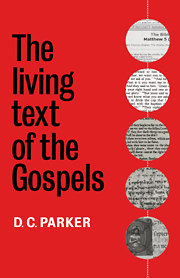Book contents
- Frontmatter
- Contents
- Preface
- List of abbreviations and frequently cited works
- 1 The theory
- 2 The materials
- 3 The practice
- 4 ‘As our Saviour taught us …’: the Lord's Prayer
- 5 The sayings on marriage and divorce
- 6 The story of the woman taken in adultery
- 7 Secrets and hypotheses
- 8 The endings of Mark's Gospel
- 9 The last three chapters of Luke
- 10 The development and transmission of the Fourth Gospel
- 11 From codex to disk
- 12 The living text
- Index of citations
- Index of Greek New Testament manuscripts
- Index of names and subjects
1 - The theory
Published online by Cambridge University Press: 05 June 2012
- Frontmatter
- Contents
- Preface
- List of abbreviations and frequently cited works
- 1 The theory
- 2 The materials
- 3 The practice
- 4 ‘As our Saviour taught us …’: the Lord's Prayer
- 5 The sayings on marriage and divorce
- 6 The story of the woman taken in adultery
- 7 Secrets and hypotheses
- 8 The endings of Mark's Gospel
- 9 The last three chapters of Luke
- 10 The development and transmission of the Fourth Gospel
- 11 From codex to disk
- 12 The living text
- Index of citations
- Index of Greek New Testament manuscripts
- Index of names and subjects
Summary
To be a well-favoured man is the gift of fortune, but to write and read comes by nature.
William Shakespeare, Much Ado About NothingTextual criticism is in essence the act of understanding what another person means by the words that are laid before me. When I sit at the meal table with my family I can observe, throughout the talk, that what is said contains broken sentences, one word spoken where another is intended, gaps and false starts. Occasionally a little enquiry is needed to sort out a particular statement, and sometimes confusion will provoke hilarity or fierce argument. But generally we meet what is intended in what is said and are unaware of the process by which we receive the words. Whether the words are spoken or written is of secondary importance. But we speak of the process as textual criticism when the words are laid before us in written form.
Everybody who reads the newspaper is expert in textual criticism, in coping with those distctive errors of omssion and displaced lines, and jumbling of letrset. This sophisticated process of recognizing nonsense and picking up the sense is so natural to us the classical scholars of ancient Alexandria or the Benedictines of that we perform it without thinking, unaware of our kinship with St Maur. Textual criticism is not an arcane science. It belongs to all human communication.
Information
- Type
- Chapter
- Information
- The Living Text of the Gospels , pp. 1 - 7Publisher: Cambridge University PressPrint publication year: 1997
